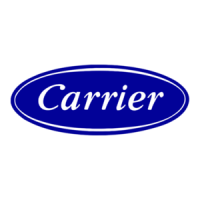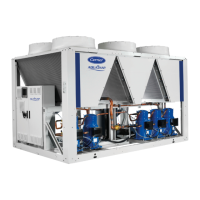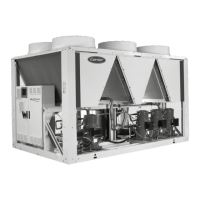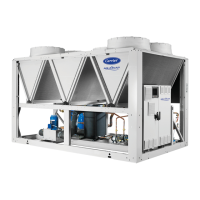34
The system ow rate is not set at a nominal value.
The ow rate will be adjusted, by varying the pump speed, to
maintain a system pressure differential value dened by the
user.
This is checked by the pressure sensor at the water exchanger
outlet (item 10 on the main water circuit diagram).
The system calculates the measured pressure difference,
compares it with the setpoint value set by the user and then
modulates the pump speed module, resulting in:
• an increase in the ow rate if the measurement is below
the setpoint,
• a decrease in the ow rate if the measurement exceeds
the setpoint.
This modulation is limited only by the maximum and minimum
ow rates for the unit and by the maximum and minimum
allowable pump speeds.
The maintained pressure difference value may, in certain cases,
differ from the setpoint value:
• if the setpoint value is too high (obtained for a ow rate higher
than the maximum value or a frequency greater than the
maximum value), the system will stop once it reaches the
maximum ow rate or maximum frequency, which will result
in a pressure difference below the setpoint,
• if the setpoint value is too low (obtained for a ow rate
lower than the minimum value or a frequency less than
the minimum value), the system will stop once it reaches
the minimum ow rate or minimum frequency, which will
result in a pressure difference greater than the setpoint.
Contact the manufacturer's service department to implement
the procedures described below
Hydronic circuit cleaning procedure
Before proceeding, it is advisable to remove any possible
contamination from the hydronic circuit.
• Start up the unit pump by using the override command.
• Control the frequency to the maximum value to generate
a higher ow.
• If there is a ‘‘Maximum ow exceeded’’ alarm, reduce the
frequency until an acceptable value is reached.
• Read the value of the ow on the user interface.
• Let the pump run for 2 hours continuously to clean up
the system's hydraulic circuit (presence of contaminating
solids).
• Perform another reading of the ow and compare this
value with the initial value. A reducing value of the ow
indicates that the lters on the system need to be removed
and cleaned. In this case, close the shut-off valves on the
water inlet and outlet (item 19) and remove the lters
(items 20 and 1) after draining the hydronic part of the
unit (items 6).
• Remove the air from the circuit (items 5 and 17).
• Repeat until all fouling is removed from the lter
Procedure for controlling the pressure differential setpoint
Once the circuit is cleaned, place the water circuit in the
conguration for which the unit selection was performed
(generally, this will be all valves open and all cooling coils
active)
Read the value of the ow on the user interface and compare
it with the theoretical value of the range:
• If the ow rate read is greater than the specied value,
reduce the pressure differential setpoint on the user
interface to reduce the ow rate value;
• If the value read is lower than the specied value, increase
the pressure differential setpoint on the user interface to
increase the ow rate value
Repeat until you obtain the ow rate corresponding to the
nominal ow rate at the unit's requisite operating point.
Stop the forced operation of the pump and proceed to the
conguration of the unit for the required control mode. Modify
the control parameters:
• Set water ow control to ‘pressure differential’
• Set the value of the required pressure differential.
The unit's default factory conguration is the minimum speed
(frequency: 30 Hz).
NOTE:
If during adjustment, the low or high frequency limits are
reached before reaching the specied ow rate, keep the
pressure differential value at its lower or higher limit as the
control parameter value.
If the user knows in advance the pressure differential value
at the unit outlet to be maintained, this value can be entered
directly as data to be declared. You should not, however, omit
the water circuit cleaning sequence

